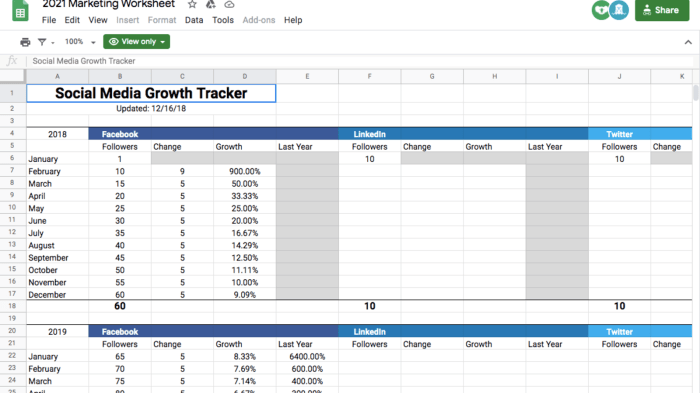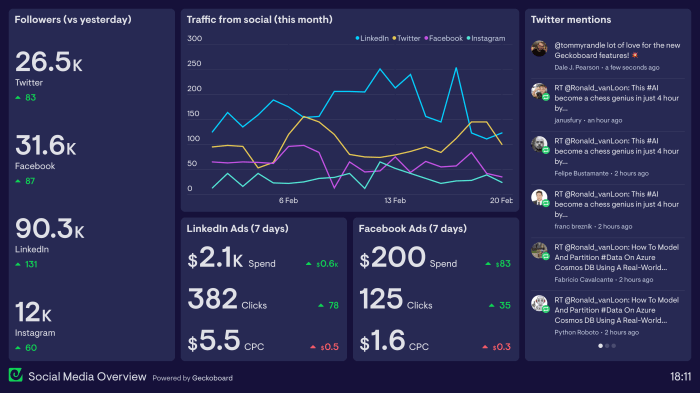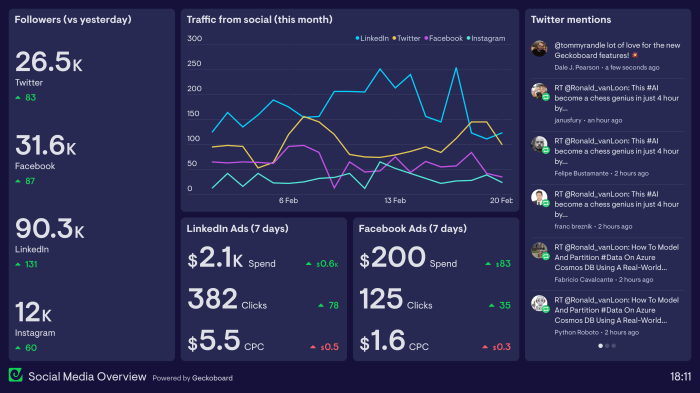Tracking Social Media Engagement sets the stage for this enthralling narrative, offering readers a glimpse into a story that is rich in detail with american high school hip style and brimming with originality from the outset.
Get ready to dive into the world of social media metrics and strategies that can elevate your online presence to new heights.
Importance of Tracking Social Media Engagement
Tracking social media engagement is crucial for businesses in today’s digital age as it helps them analyze the effectiveness of their social media strategies and understand their audience better.
Metrics for Tracking Social Media Engagement
There are several key metrics commonly used to track social media engagement:
- Likes, comments, and shares: These interactions indicate audience engagement with the content posted by the business.
- Click-through rate (CTR): This metric measures the percentage of users who clicked on a link in a post, showing how effective the content is at driving traffic.
- Reach and impressions: Reach refers to the number of unique users who saw a post, while impressions represent the total number of times a post was displayed. These metrics help businesses understand the visibility of their content.
- Engagement rate: This metric calculates the level of interaction a post receives relative to the number of followers, providing insights into audience engagement levels.
Understanding Audience Behavior through Tracking Social Media Engagement
By tracking social media engagement, businesses can gain valuable insights into audience behavior, preferences, and interests. This information allows businesses to tailor their content and strategies to better resonate with their target audience, leading to increased brand awareness, customer loyalty, and ultimately, business growth.
Tools for Tracking Social Media Engagement

Tracking social media engagement is crucial for businesses to understand their audience and improve their online presence. There are various tools available to help track social media engagement, each with its own unique features and benefits.
Popular Tools for Tracking Social Media Engagement
- Sprout Social: This tool offers in-depth analytics, scheduling capabilities, and social listening features to track engagement across different platforms.
- Hootsuite: Hootsuite allows users to monitor multiple social media accounts, schedule posts, and analyze engagement metrics in one dashboard.
- Buffer: Buffer is known for its user-friendly interface, scheduling options, and detailed analytics to track social media performance.
Features of Different Tools for Tracking Social Media Engagement
- Sprout Social provides detailed insights into audience demographics, post performance, and engagement metrics.
- Hootsuite offers real-time monitoring, team collaboration tools, and customizable reports for tracking social media engagement.
- Buffer focuses on easy post scheduling, engagement analytics, and integration with other tools for comprehensive social media tracking.
Advantages and Disadvantages of Automated Tools vs. Manual Tracking Methods
- Automated Tools:
- Advantages: Automated tools save time, provide real-time data, and offer in-depth analytics for better decision-making.
- Disadvantages: Automated tools may lack personalization, cost money, and sometimes require technical expertise to set up and interpret data accurately.
- Manual Tracking Methods:
- Advantages: Manual tracking allows for more customization, personalization, and a deeper understanding of individual metrics.
- Disadvantages: Manual tracking can be time-consuming, prone to errors, and may not provide real-time data for immediate action.
Strategies for Improving Social Media Engagement: Tracking Social Media Engagement

Organic social media engagement is crucial for building a strong online presence. By implementing the right strategies, you can increase your reach and create meaningful connections with your audience. One of the key factors in improving social media engagement is the quality of your content. Compelling and relevant content will attract more followers and encourage them to interact with your posts. Below are some effective strategies for enhancing your social media engagement:
Tip #1: Consistent Posting Schedule
Maintaining a regular posting schedule is essential for keeping your audience engaged. By posting consistently, you can stay at the top of your followers’ feeds and increase the chances of them interacting with your content.
Tip #2: Engage with Your Audience
Responding to comments, messages, and mentions shows your followers that you value their input. Engaging with your audience can help foster a sense of community and loyalty around your brand, leading to higher engagement rates.
Tip #3: Use Visual Content
Visual content, such as images, videos, and infographics, tends to perform better on social media platforms. Including eye-catching visuals in your posts can attract more attention and encourage higher levels of engagement from your audience.
Tip #4: Run Contests and Giveaways
Contests and giveaways are effective ways to boost social media engagement. By offering prizes or incentives, you can motivate your followers to like, comment, and share your posts, increasing visibility and engagement.
Tip #5: Collaborate with Influencers
Partnering with influencers in your industry can help expand your reach and improve social media engagement. Influencers have dedicated followings who trust their recommendations, making them valuable allies in increasing engagement with your brand.
Tip #6: Analyze and Optimize Your Strategy
Regularly monitoring your social media analytics can provide valuable insights into what content resonates with your audience. Use this data to adjust your strategy, optimize your posts, and continue improving your social media engagement over time.
Measuring the Effectiveness of Social Media Campaigns
In the world of social media marketing, measuring the effectiveness of your campaigns is crucial for success. Tracking social media engagement is a key component in determining how well your campaigns are performing and can provide valuable insights into what is resonating with your audience.
Importance of Setting Goals and KPIs for Social Media Campaigns
Setting clear goals and key performance indicators (KPIs) for your social media campaigns is essential for measuring their effectiveness. By defining specific objectives, such as increasing brand awareness, driving website traffic, or generating leads, you can track the success of your campaigns and make data-driven decisions to optimize performance.
- Establishing goals helps you focus your efforts and resources on what matters most to your business.
- Setting KPIs allows you to track progress towards your goals and evaluate the impact of your social media campaigns.
- Measuring the right metrics, such as engagement rate, click-through rate, and conversion rate, can provide valuable insights into the effectiveness of your campaigns.
Examples of Businesses Optimizing Campaigns with Social Media Engagement Data
Many businesses have leveraged social media engagement data to optimize their campaigns and achieve better results. For example:
1. A clothing brand analyzed social media engagement data to identify the most popular products among their followers and used this information to create targeted advertising campaigns.
2. An e-commerce company tracked social media engagement metrics to determine the best times to post content and optimize their posting schedule for maximum reach and engagement.
3. A tech startup monitored social media engagement to identify trends in customer feedback and used this data to improve their products and services based on customer preferences.
